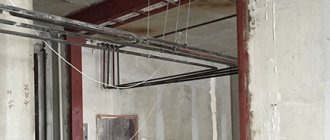Is it possible to store a bicycle, cabinets, and other things on the landing, in the entrance or in the corridor?
Common building premises are stairs, their flights and landings, basements, attics, elevators, etc. They belong to the right of shared ownership by the owners of the apartments of this building. The ownership share depends on the area of the apartment.
That is, apartment owners have the right to own and use common premises. However, this right does not apply to:
- some hostels. For example, where students or military personnel live;
- municipal housing, since the owner there is the municipality.
The law imposes some restrictions on the use of common property.
First of all, it must be kept in proper condition:
- carry out major and cosmetic repairs;
- regularly carry out wet cleaning;
- monitor the temperature;
- maintain the power supply system and other technical communications in good condition;
- take out garbage, and especially not litter the premises;
- preserve the architectural appearance of the entire building.
Residents do all this on their own or involve a management company.
There is also an important restriction on the use of common property. You cannot violate or limit the rights of other residents - neighbors. And it is also prohibited to clutter the entrance with your belongings.
When not to
You need to keep a closet, drawers, bicycles, strollers and even motorcycles in your apartment. If there is no separate storage room, then this can be done in the hallway or on the balcony. But in any case, not at the entrance.
This ban is due, first of all, to considerations of the safety of the residents themselves. Indeed, in the event of a fire, evacuation from the house will be complicated by objects standing on the stairs and landings.
The management company is also interested in having an entrance free of various rubbish. After all, it can interfere with the maintenance of the communication systems of your home.
Rules for living in apartment buildings and fire safety rules impose a number of restrictions on the use of common premises. So, you can't:
- store things in the entrance, landing and flights, elevator, basement, attic, or in any technical rooms;
- keep explosive substances in all of the above rooms, as well as on the balcony and loggia;
- fence off part of the common area for personal use (that is, make a vestibule);
- install dryers;
- keep any animals.
However, there are exceptions to any rule. Especially if you come to an agreement with your neighbors.
In what cases is it possible
The width of escape routes, by law, must be at least 1.2 meters. It turns out that if things reduce the passage no narrower than to this width, then you can still leave them.
But they shouldn't be:
- explosive;
- flammable;
- decomposing - that is, they should not stink, deteriorate, or attract cockroaches and mice.
We must not forget about the right of shared ownership. The occupied area should be proportional to the total square footage of the apartment.
And one last clarification: you need to ask the consent of your neighbors. Preferably in writing. If they are against the fact that you have occupied part of the driveway, then you will have to remove these things. Because the law is on their side.
How to get neighbors to remove trash from the hallway
Looking at the Housing Code of the Russian Federation, you can read that those premises of an apartment building that do not belong to parts of the apartments, and serve to serve at least two premises, can be called the common property of the owners of the apartments of the building.
Only with their decision, taken at collective meetings, such objects related to the common property in the house can be transferred to third parties for use, provided that such actions do not violate the rights and interests of citizens, as well as legal entities.
Simply put, if any of the owners express disagreement, any storage in the corridor will be contrary to the law.
It is for this reason that you can contact the organization directly responsible for your home. You can request information about it from the senior house by going to the district or district website, or using the Unified Register of House Management.
If you intend to write such an appeal, it would be useful to attach photos of the “corridor barricades” that you took.
The management organization accepts the application and sends its representative to draw up an act. The document will be used to issue an order to your neighbors to vacate the corridor within a specified period.
If the passage is blocked
It is not allowed to place things on staircase landings. It is prohibited to obstruct approaches to fire extinguishing equipment, entrances to attic spaces and staircases.
If you find that any of the passages are blocked, you must file a complaint with the Department of the Ministry of Emergency Situations.
When neighbors blatantly avoid receiving the order and evade firefighters in various ways, you can contact the local police station with your toad. Having received a warning twice, neighbors subsequently face a fine.
Legal assistance on housing issues is free.
Read here how to force your neighbors not to smoke in the entrance.
How to stop your neighbors from making noise, read the link:
When laziness is to blame
It often happens that on the site or in the corridor all sorts of rubbish suddenly appears in the form of pieces of wood, a chair with a broken armrest, a refrigerator that has expired, in general, accumulations of everything unnecessary, but, according to neighbors, so voluminous and heavy that It is impossible to convey this to street containers.
In this case, if you have exact information about the owners of this garbage, you need to complain to the fire service and the management organization.
A little ingenuity
If time continues to pass, the neighbors do not think to move, and complaints and quarrels with residents are not for you, you can try hanging a notice in a prominent place , in which, in a strict and instructive form, information is conveyed to the residents about the obvious fire hazard posed by the rubbish they put out, and also about the severity of the punishment that those who do not remove such garbage within a certain time may suffer.
There is a possibility that such a tactical move will have an effect, and the passage will be cleared. Some note the effectiveness of periodically placing neighbors' garbage under their doors.
In some cases, it doesn’t hurt to think together with your neighbors about how to place bicycles on the wall so as not to interfere with the passage, or to designate everyone their own place for a baby stroller.
Where to contact
It happens, although not often, that a simple conversation and a request to vacate passages and common areas is enough. So before you complain, just talk to your neighbor.
The next step could be a residents' meeting. The violator will be given a warning. But be sure to record the progress of the meeting and collect signatures.
If it is not possible to resolve the conflict peacefully, you must contact the authorized bodies. Where exactly?
We complain to the Criminal Code
The first authority will be the management company. Ensuring the cleanliness of common areas is her direct responsibility.
Basic principles for drawing up an application:
- oral appeals are not so effective, submit in writing;
- describe in detail the reasons for your request;
- focus on the fact that clutter in the entrance hall interferes with access to apartments, and garbage and old things can attract rats and cockroaches;
- attach photographs of the clutter;
- tell them that requests to clear the house of objects that bother you did not work;
- ask to force these residents to remove all unnecessary things from the mentioned territory.
Download a sample application to the management here[/anchor]. ⇐
The complaint can be submitted independently or sent by registered mail.
In response, the Criminal Code is obliged to create a commission and carry out an inspection. Based on its results, an act is drawn up in which all comments are entered. The act is signed by members of the commission and interested neighbors.
It is better to make a copy of the act. It can be evidence of the measures taken if the case goes to court.
To the fire department
The next authority that controls the staircases and platforms between floors free from rubble is the fire inspectorate (a division of the Ministry of Emergency Situations). It can not only issue an order and fine those who like to store garbage, but also punish the management company for inaction.
⇒ There is a separate article on the rules for contacting the fire inspectorate on our website.
Rospotrebnadzor
If unscrupulous neighbors forget to take out the trash and put it in a common corridor or vestibule, then you have a direct route to Rospotrebnadzor.
This organization monitors the sanitary condition of residential and administrative buildings.
And all residents, whether they are owners or tenants, are required to monitor not only compliance with fire safety standards, but also the cleanliness of the house.
In your application, please describe:
- your last name, first name, patronymic and address;
- address of the offender;
- sanitary situation of common areas with photos and videos attached as evidence.
Download a sample application to Rospotrebnadzor here. ⇐
The Rospotrebnadzor commission will conduct an inspection and draw up a protocol.
If the fact of clogging of common premises is confirmed, a conversation is held with the violator and a fine is issued.
In addition, within 30 days, representatives of the organization are required to give a written response to the applicant.
To court
The court is the final authority when all previously taken measures have not brought positive results.
When going to court you must:
- in the statement of claim, describe in detail what happened, and refer to the laws, and not to your emotions;
- pay the fee;
- enlist the support of neighbors and all the organizations listed above;
- attach copies of appeals to other authorities, protocols of inspections;
- photos and videos of clogged rooms.
The application form to the court is available ⇐
It may happen that the slobs will only need one summons from the court, and your entrance will sparkle with cleanliness.
If this does not happen, the court will listen to all parties, witness testimony and make a decision. And most likely, it will be in favor of the applicants.
Littering of other common areas in apartment buildings
More serious authorities for filing a complaint if neighbors pollute and litter common areas with garbage and bulky items are the district police officer and the court. You should file a complaint with the local police officer when troublemakers refuse to remove their trash and deliberately avoid contact with employees of the Criminal Code, Rospotrebnadzor or the fire inspectorate. They do this in order not to receive appropriate instructions and restore order from competent organizations. As a result of this, a fine cannot be imposed on them, and therefore, the neighbors do not learn any punishment or lesson from their behavior. It is in these cases that a statement written in the name of the district police officer will help solve the problem. There is no sample of an exact statement here, so you can write it in free form. The main thing is to indicate who is writing the claim and tell in the descriptive part what the essence of the appeal is.
If there are several affected residents, then it makes sense to draw up a collective document that will contain the signatures and names of all citizens who want to punish their dirty neighbors.
The court is the most serious authority, where not just a complaint is drawn up, but a statement of claim, which indicates not only the essence of the problem, but also a request for punishment. In order for the statement to have more significant significance, it is worth attaching an evidence base, which will include:
- photographs of a cluttered common home area;
- letters addressed to offending neighbors asking them to clean up the area;
- copies of statements and complaints that were previously sent to other organizations (Rospotrebnadzor, fire inspectorate, district police officer);
- witness statements.
In cases where it comes to litigation, the result always leads to neighbors quickly cleaning up the stairwell or hallway, throwing out all the things that previously caused discomfort to the people living around them.
What else can you do
It is better to equip a storage space in your apartment. For example, a folding stroller or even a moped will fit perfectly on the balcony. And the bike can easily be hung on the wall. This will make for an interesting interior detail.
Of course, to do this you will have to keep the wheels clean.
As for old furniture and clothes, leftover building materials, it is better not to store them at all. It is believed that if you don’t need an item for a year, you will never remember about it.
If you yourself don’t put anything in the entrance, but your neighbors’ things literally leave no way through, under no circumstances throw them out yourself. After all, it is someone else's property.
We solve the problem with a compromise
It is better not to aggravate relations with neighbors and become diplomats for a while. To do this, you can invite them for a cup of coffee and ask them to clean up the common area.
If the corridor is designed for 3-4 families, you can organize a meeting. In the presence of a large number of people, unscrupulous residents will take up the task of correcting and removing the trash. They will simply be uncomfortable in front of people, and they will understand that the request is not the whim of one person.
At the meeting, you can propose ideas for improving the design of the common corridor. For example, organize a separate place for bicycles, and you can also hang them on the wall. You can install a mirror for everyone and put a stand for changing shoes. Suggestions for creating comfort will not go unnoticed.
Written request
It happens that neighbors work and are rarely at home, and it is almost impossible to catch them. The way out of the situation is to create a collective letter outlining requests to restore order. The message is placed in the mailbox or attached to the front door of the apartment.
It is important that as many residents as possible sign the appeal. Make a copy of the document, which will be proof of your efforts to create comfort and the lack of reaction from neighbors. The document is especially valuable if you go to court to solve a problem.
Fines for littering MOPs
For storing things in common corridors and entrances, the law provides for liability in the form of a fine.
For violation of fire safety rules, in accordance with Article 20.4 of the Code of Administrative Offenses of the Russian Federation, a fine of 2 to 3 thousand rubles is provided for individuals, and a fine of 150 to 200 thousand rubles for legal entities. The legal entity in this case is the management company.
Also, a fine may be imposed on the Criminal Code for improper maintenance of residential buildings - 40-50 thousand rubles (Code of Administrative Offenses of the Russian Federation, Article 7.22).
Other authorities can also issue fines of varying sizes - Rospotrebnadzor (500-1000 rubles) and the fire inspectorate (up to 30 thousand rubles).
Each time a violation is repeated, the fine increases. This may force slobs to clear out the clutter.
General rules for cohabitation in apartment buildings
Who and for what purposes can use the common premises in the apartment building? Photo No. 1
The Housing Code of the Russian Federation establishes the right of common ownership for common areas in the house for residents of apartment buildings (MKD). These include common corridors, stairs, attics, basements, including landings. All owners of apartments in MKD can use these places according to their share. However, such use must not harm it or disturb its neighbors.
In addition, residents must maintain the common property of the house in proper condition. It is important to comply with sanitary and fire safety standards. Placement of things, furniture and other flammable materials on stairwells, corridors, utility rooms is not allowed. In addition, you must not interfere with access to other rooms, stairs, fire exits, or elevators.
Housing inspection
A complaint should be filed with the authorized body against the management company that monitors the use of common property. The document is submitted officially through the office of the government agency, indicating the entry number and date of acceptance. A copy with marks remains in the hands of the applicant. If violations are detected, the service organization as a legal entity will be held liable.
Rice. 2. What to do if common property is used in violation
Often, clutter in the corridor is associated with a violation of fire safety rules. Especially when there is construction debris left in the premises after renovation or flammable items, or the exit from the apartments is blocked, which creates a dangerous situation in case of an emergency. In this case, you should contact the inspectorate with a complaint.
We invite you to read: What is considered absenteeism under the Labor Code in 2020
Typically, employees respond promptly and go to the site to check within a few days. If violations are detected, they are recorded in an act with the issuance of a warning to remove obstacles to the use of common property or the imposition of an administrative fine. In any case, you will be forced to remove garbage or clear the room of furniture or belongings if the contents of the common area are found to be in accordance with the law.
Attention: Improper use of a common area can not only cause property damage if, for example, it is used for other purposes - for storing food, things, boxes - but also threaten the life and health of citizens living in neighboring apartments.
Rospotrebnadzor
The functions of the Rospotrebnadzor body include monitoring compliance with sanitary standards in public places, which also include premises in multi-apartment residential buildings. Littering the area can block engineering structures and access to them, as well as create an unfavorable epidemiological situation.
Rice. 3. What to do if the common corridor is cluttered
What to do if your neighbors' littering in their apartment interferes with other residents?
You can complain about untidy neighbors not only when common areas in the house are cluttered. Article 30 of the Housing Code of the Russian Federation gives all owners (tenants) of residential premises the obligation to comply with the prescribed sanitary, fire and other standards when using their apartment. The use of your apartment should not violate the interests of other residents.
If garbage has accumulated in a neighbor’s apartment and an unpleasant odor spreads throughout the house, then this is already a violation. Or when the neighbor’s balcony is so filled with things that there is a danger of them falling on passers-by. In all such cases, you can also seek help from the Criminal Code, housing inspections, and sanitary inspection authorities (Rospotrebnadzor).
Complaint to the State Property Committee
The management company cannot disconnect the offender from the public networks or evict him due to littering of the common area, therefore, when the tenant ignores the requests of neighbors and the requirements of the Criminal Code, the victims should contact the Housing Inspectorate.
You can also file a complaint with this body about the inaction of the management company’s employees. In this case, a fine will be imposed on the guilty persons.
The period for consideration of citizens' complaints in the Housing Inspectorate is 1 month.
Watch the video. What to do if neighbors litter the corridor or landing:
Making a complaint
Complaints submitted to government agencies must be properly formatted.
They are required to indicate:
- name of government agency;
- information about the offender and the applicant;
- the place where the offense was committed and the essence of the unlawful act;
- requirements;
- date of filing.
The complaint must be double-checked several times before submission, as it should not contain any typos or errors.
Don't agree? Complain
First of all, you need to try to “reach out” to your neighbors, or rather, to their common sense. Explain that they are not just preventing you from entering the apartment normally, but have blocked the fire entrances and exits. It must be recalled that in emergency situations the corridor is the main route of evacuation and its clutter can lead to tragic consequences. If all your arguments do not produce results, complain.
Irina Kondratyuk, a specialist in the field of housing and communal services, advises, first of all, to file complaints against neighbors with the management company, HOA or housing cooperative, that is, with the one who maintains the house.
“They, in turn, must issue an order to the homeowners.” If such an order is not fulfilled, you can contact the housing inspectorate or the court so that they can take administrative measures, says Irina Kondratyuk.
She adds that the Housing Inspectorate of Crimea receives from 150 to 700 complaints every week, the lion's share of which relate to the insufficient activities of management companies, homeowners' associations and house councils.
If for some reason the house does not have management (there are few such houses in Crimea), residents have the right to write a complaint against their neighbors to the interdepartmental commission of the city or district administration.







